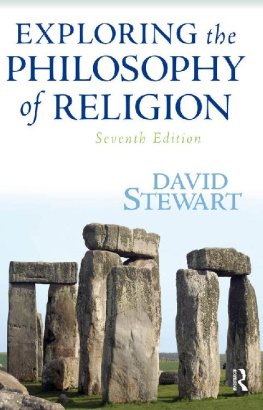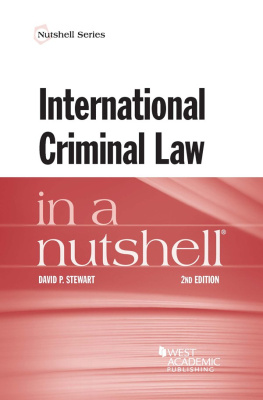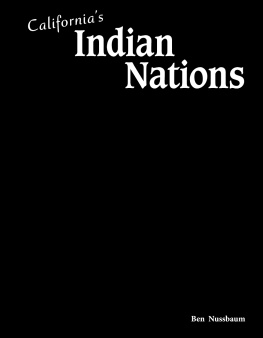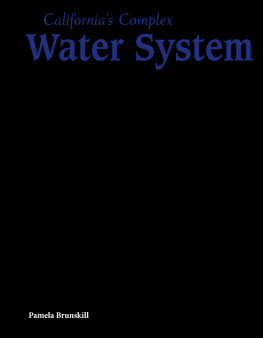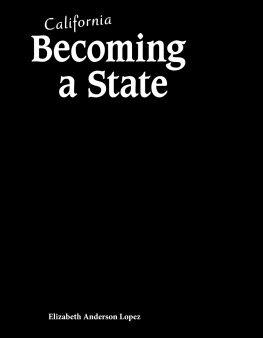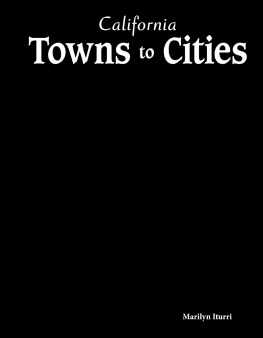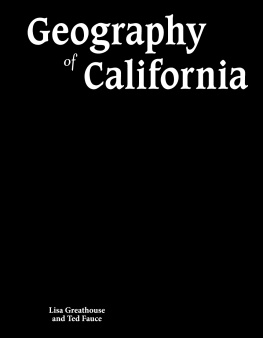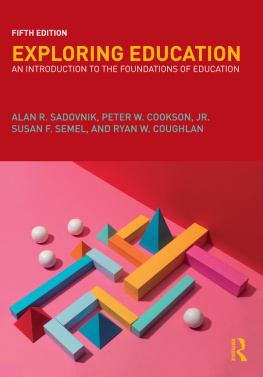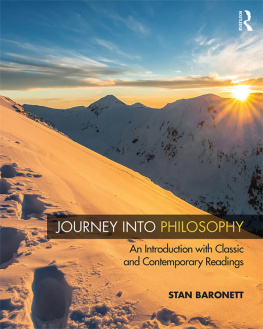
EXPLORING THE
PHILOSOPHY OF RELIGION


SEVENTH EDITION
EXPLORING THE
PHILOSOPHY OF
RELIGION
David Stewart
Ohio University
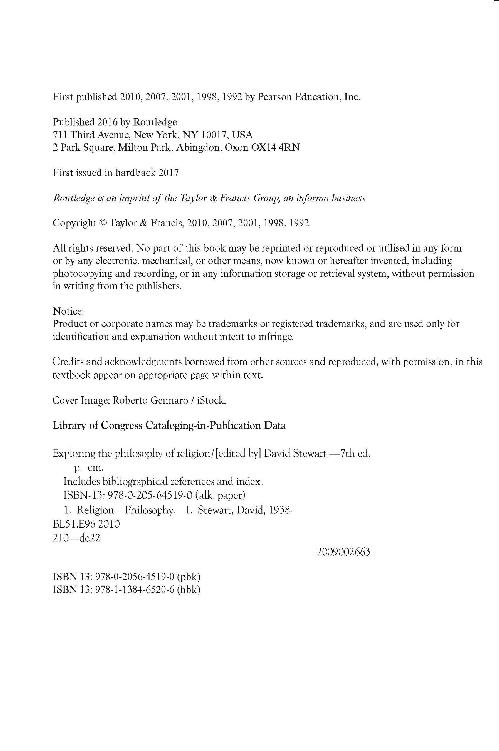
Contents
William James 9
Sarvepalli Radhakrishnan 17
Walter Kaufmann 29
John Hick 38
v
vi
Contents
William Paley 55
Friedrich Nietzsche 60
Leo Tolstoy 65
Kai Nielsen 74
Plato 89
Epicurus 98
Neil Gillman 102
Walpola Rahula 114
Contents
vii
Ren Descartes 128
William Lane Craig 136
William Paley 144
Immanuel Kant 153
C. S. Lewis 171
David Ray Griffin 180
viii
Contents
Wendy Doniger 190
John Hick 198
Antony Flew, R. M. Hare, and Basil Mitchell 218
William James 233
David Hume 246
Sren Kierkegaard 256
Contents
ix
John Locke 269
Rosemary Radford Ruether 277
Henri Bergson 291
Ronald Dworkin 302

This new edition continues the plan of previous ones of providing a book that combines the best features of a text and a reader by giving both clear and understandable analysis coupled with important primary-source readings. The topics included have a permanent place in the philosophy of religion, but users of the book do not need to follow the order of the chapters as they are presented here.
As is always the case, a new edition allows for the inclusion of material that reflects current topics of interest. The selection from Rosemary Ruether in
d, continued from the prior edition, allows readers to discuss why so many religious traditions have suppressed the role of women. This is but one of the series of current issues that this chapter highlights, beginning with the topic of the separation of religion from government. While those of us in the West might think this has been settled in favor of a secular-state model, the issue is by no means dead in the rest of the world, where powerful forces are at work to replace the secular-state model with a theocratic one. Even in our nation, committed in its constitution to the separation of church and state, advocates of the majority religion continuously campaign for governmental recognition and support of religious activities and symbols. The reading from John Locke provides a philosophical context for this issue.
Also in chapter seven, in a section entitled Religion and World Origins, the reading from Henri Bergson offers an alternative to the naturalistic assumptions behind Darwinian evolution. The ideal of a developmental model of world origins, including the origins of life, need not be seen as a threat to a religious view of reality if it is isolated from the naturalistic assumptions that some bring to an evolutionary view. The reading from Bergson will allow for a discussion of evolution apart from a naturalistic metaphysics.
The final new selection in this chapter is from the legal and moral scholar Ronald Dworkin and discusses the contentious issues surrounding abortion. Just as Dworkin searches for a new way of framing the issues, this section is entitled in a neutral way as Religion and Human Origins.
xi
xii
Preface
Brought back to this edition from prior ones are two authors that reviewers suggested should be reinstated: C. S. Lewis on the problem of evil and Radhakrishnan on religious experience.
Sincere thanks are in order to former Prentice Hall philosophy editor David Repetto for providing the opportunity for a new edition and to Maggie Barbieri for her support and editorial guidance.
David Stewart
Ohio University
EXPLORING THE
PHILOSOPHY OF RELIGION


Both philosophy and religion are common terms, although defining them precisely is difficult due to the diversity of meanings each has acquired. The word religion derives from a Latin term that referred to the bond between man and the gods, and in the view of most persons religion implies a belief in some kind of supernatural being or beings. This is the definition of religion usually offered by dictionaries, but such an understanding of religion would exclude some religious traditions; for example, in Confucianism the question of the existence of supernatural beings never arises.
Further complicating the problem of arriving at a satisfactory definition of religion is the wide diversity of religious traditions. Every culture has a religious tradition of some sort, and these are as varied as the cultures that gave them birth. Many religious traditions are thoroughly bound up with cultic and ritual practices, but others are not. Some religions are tied to a priesthood, but this is not true of all. Divine revelation plays an important role in some traditions, but the relative importance of revelation in contrast with what can be known by reason alone is itself often a matter of disagreement.
In the study of religion, one response to this diversity of meanings is to adopt a neutral, descriptive approach. That is, one simply investigates a religion in its various cultural manifestations, describing religious phenomena, whatever they may be.
Such descriptive study concentrates on comparing or contrasting the various modes of religious awareness that are encountered and perhaps deriving certain conclusions from this descriptive analysis about the nature of the religion under study. Whatever the merits of this approach may be, it cannot be considered a philosophical study of religion, for philosophy is the critical examination of human life and thought.
The Varieties of Religious Experience
The study of religion, like the study of any other organized human activity, can be approached from a variety of standpoints. The historian, sociologist, and psychologist each approach religion with a unique concern. The historian will be interested in the development of a religious tradition over time, its similarities to other traditions, and the influence that a religion has on the economic, political, and social affairs of a particular society. The sociologist is concerned with discovering what societal values are expressed in a religious tradition, how the religious beliefs of a group provide cohesiveness in a society, and how stratifications within the society are affected by its religious traditions. The psychologist will focus on belief structures themselves as indicative of a particular kind of self-understanding. Of course, the concerns of historians, sociologists, and psychologists will overlap, for the borderline between disciplines is not always sharply defined.
Besides the differences among the interests of the various academic disciplines, there is also the difference between being a student of a religion and being a believer
Next page
